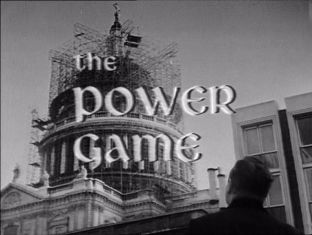

Tuesday 4 March 1969
“Special Envoy:The Heart Market ” Writer Wilfred Greatorex Director James Omerod.
“Less than 15 months ago, the world was staggered by the news that a South African surgeon, Dr Christiaan Barnard, had replaced the failing heart of a 56-year old man with that of a young woman. Tonight in The Power Game, Sir John Wilder’s long-standing rival, Caswell Bligh goes under the knife to receive a new heart. What are his chances? According to Dr Barnard, about three-to-one against. Since that historic operation in December 1967, 109 heart transplant operations have been carried out. More than 30 of the patients are still alive. The operations have been shrouded in controversy; their cost is tremendous….The Power Game raises other questions. The inevitable one being – could men of power and wealth be first in the queue for new hearts?” TV Times.
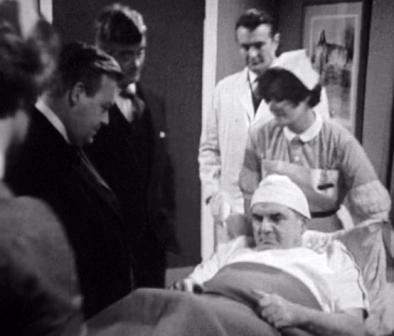
"Bury me standing," Caswell Bligh tells Wilder, "Facing you!"
The ailing Caswell Bligh (Clifford Evans) attaches himself to Sir John Wilder’s mission to Somalia in the hope of claiming credit for Wilder’s success. In the middle of an argument with Wilder, Bligh collapses and is flown back to London. He is told that his heart is failing and that he could die at any moment. Although Bligh initially rejects the idea of a heart transplant, Wilder taunts him into accepting. .
Don Henderson (Jack Watling) sends for Bligh’s estranged son Ken (Peter Barkworth) and tells him that Caswell is dying. Ken refuses to see his father, blaming him for the breakdown of his marriage. However, Ken demands that Wilder give him a contract for building the hospitals in Somalia.
Wilder’s private secretary, Lincoln Dowling (Michael Jayston) finds common ground with Ken, as he tries to his ensure his future..
Script Editor Wilfred Greatorex delivers a powerful episode which brings the conflict between Wilder and Bligh to a climax. His opening scene conveys a lot of explanatory detail about the story and the relationships between the characters, while still engaging the audience in the rivalry between the two men. Bligh and Wilder are aboard a light jet aircraft flying from Abyssinia (northern Ethiopia) to Somalia. Lincoln Dowling (Michael Jayston), Don Henderson (Jack Watling), and Bligh’s Private Secretary, Hindlesham (David Saville) are also aboard. Bligh deduces that Wilder is trying to sell fully-equipped hospitals to the newly independent Somalian government. Although the country is poor, it is strategically well-placed for the Indian Ocean, now that Britain is pulling out East of Suez. Wilder suspects that Dowling or Henderson must have told Bligh, but Caswell had got Embassy staff at Abbis Abbaba to “juggle the facts and come up with hospitals.”

As Wilder congratulates Dowling (Michael Jayston) the civil servant says he's " glad to know professionals have their uses."
Wilder and Dowling meet with the Prime Minister (Tutte Lemkov) and offer four hospitals built with interest-free loans from Britain (“repayment to be discussed”). The Prime Minister responds that he understands self interest. Both Britain and its rival Italy, “find Somalia well placed geographically in case of war.” However, he needs an assurance that, “your technicians sent to build hospitals will be really technicians and not defence experts.”
As they leave the meeting, Wilder congratulates Dowling on suggesting he get Don to inform Caswell they were meeting Pastore (Frank Olegario), the Minister of Health. This has had the effect of keeping Bligh out of the real negotiations, and ensuring he will alert the half-Italian Pastore, who is now steaming to the Prime Minister’s office. At the time this episode was made, Somalia had a government which tried to unite the peoples of British Somaliland and Italian Somaliland. Dowling predicts that, “Pastore – for reasons of ancestry – will push the Italian interest too far, for the Prime Ministers taste. He’s not enamoured of half-Italians. I think the job’s yours.”
Back at the hotel, Hindlesham brings the exhausted Bligh a bucket of ice, warning Bligh he’s just taken his seventh codeine tablet. He leaves Bligh with Wilder who says, “I never thought to see you prostrate – but it doesn’t please me.”

Bligh refuses Wilder’s advice to go home, saying he’s going to see the contract’s agreed. Wilder reminds Bligh that he’d tried to send Wilder to a conference in Geneva. The Foreign Secretary told Bligh to release him, after Wilder told the Foreign Secretary about the hospital deal. “He knows you had nothing to do with it. Everyone knows.”
Director James Omerod ramps up the tension within the hotel room - lowering the lighting , with Wilder facing one wall, while Caswell looks towards the other. “All I know,” says Caswell, “Is if it hadn’t been for you I wouldn’t have sold my firm. Then you interfered and smashed up my relationship with my son. Now you sit there gloating…you don’t care about Britain. All you care about is your own glory!
Bligh tries to continue as the pain sweeps over him and suddenly collapses into Wilder’s arms. Shocked, Wilder tells the hotel switchboard to call the Prime Minister’s doctor, and then gets Henderson and Dowling to organise flights back to London via Nairobi and a private clinic in London. .
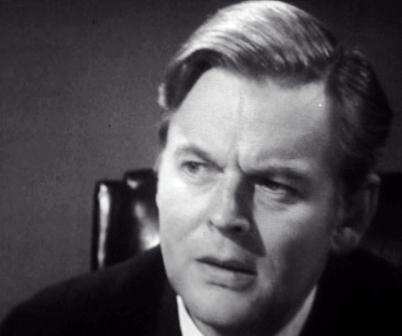
Back in London Don sends for Ken Bligh (Peter Barkworth) who comes to the office thinking he’s going to be offered a contract. Ken is drunk and embittered about the break-up of his marriage for which he blames Caswell. Even when Don tells him Caswell is dying, Ken refuses to see him.
At the clinic, Bligh’s surgeon Graham Harrison (Kendrick Owen) tells him “With luck and care you could live a year. Without…tomorrow – today if you insist on charging off.”
Harrison proposes a heart transplant. Bligh initially refuses. “I’m against all this spare part surgery. I’m not going to be made a guinea pig. If my heart isn’t good enough, neither is anybody elses!”
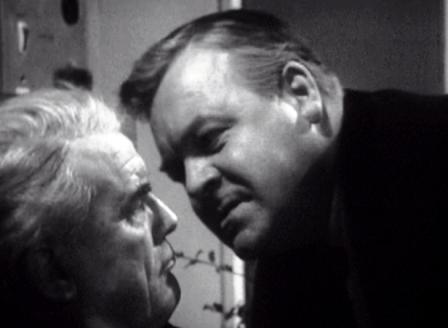
Wilder is infuriated.“You sound more and more like a 20th century Roundhead. I’ve always doubted this progressive streak you’ve claimed”. Bligh persists that, “They’ll put nobody else’s heart in me!” and Wilder leans over the bed, challenging Bligh, “Or is it that you’re scared? It’s not the principle that worries you – the philosophy. You haven’t got the guts!”
Chastened, Caswell tells Harrison he’s decided to go ahead with the surgery and then characteristically demands that they start right away. Harrison warns him that it’s not so easy. First they need a heart.
As Wilder returns to his office, he is visited by Ken who demands a contract for the work in Somalia. “When you took Don as your PA, you robbed me of a loyal partner and promised me enough work for two years.” Wilder tells him he gave him two contracts. “You fell flat on your face with the first and underpriced the second.You haven’t learned anything.”
Don makes it clear that he knows both Straker and Ormes are on the short list. He tells Wilder he knows a number of MP’s who would be disturbed to hear about a long term commitment East of Suez. “What would those same MP’s make of the fact that both Strakers and Ormes have offered you Managing Directorships when you leave?”
Wilder glares suspiciously at Dowling and Henderson, wondering who has talked. He placates Ken, telling him that he can’t recommend his firm for Somalia but there are other jobs in the pipeline. Nevertheless, the condition is that he makes up with Caswell who is “like an aging Sheepdog.”
Invigorated by the prospect of his heart transplant, Caswell tries to sour Wilder’s deal, telling the Foreign Secretary that the Italians are put out by “Wilder’s invasion”, that Britain will need their help in European projects and that he knows a couple of British firms that could build power stations for the Somalians. When he learns this, Wilder thinks his one chance is to save the deal is to show that Bligh was scuttling the plan because he knew Ken was the main contractor. Dowling anxiously says that won’t work because Bligh could plead he was anxious to avoid the appearance nepotism.
Back at the hospital, Bligh’s surgeon has located a heart. The potential donor is a young husband and father smashed up in a motorbike crash. “He’s got a heart in what you may call mint condition” His surgeon tells him there’s no need for sentimentality “When you were a civil engineer you needed ballast and tarmac to build your roads. We need spare parts to rebuild people.”
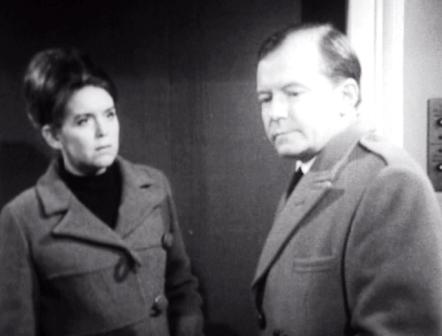
Colette O’Neil, in the crucial role of Mrs Taylor, more recently appeared in the film ‘Mortdecai (2016)’, Wallender & Shetland.
The surgeon tells tells Bligh the “ most difficult problem of all (is) the permission of the next of kin.” His assistants are using all their skills to persuade the wife but they need to give her time to come to terms with the situation. He predicts her husband has 72 hours to live. Bligh gets Hindlesham to find out the identity of the donor. Caswell then asks Ken to visit Mrs Taylor (Colette O’Neil) and offer financial help. “This is buying a heart” Ken challenges, but Caswell denies it. Ken visits the exhausted wife and mother who tells him about the sort of person her husband was and then asks to see Caswell. Before she goes into his room she tells Ken she will give permission. She just wants to what his father’s like. But Caswell assumes Ken hasn’t sealed the deal and genially starts making financial offers. As the horrified woman leaves the room Ken follows saying Caswell doesn’t deserve a heart. She softly chides him saying Caswell’s his father. She asks him to put £20,00 in a trust fund for her children. “I wouldn’t touch a penny but the children might need it – I hope they won’t - but they may do.”-
The next day, Hindlesham is dispatched to deliver a wreath to Mrs Taylor, while Bligh is prepared for the operation. Wilder visits, lying to Bligh that Ken is on his way. As Caswell is wheeled out of the room he tells Wilder “If I don’t come out of this bury me standing. Facing you.”
Ken arrives, in time to see his father being taken down to the Operating Theatre. He has nothing to say.
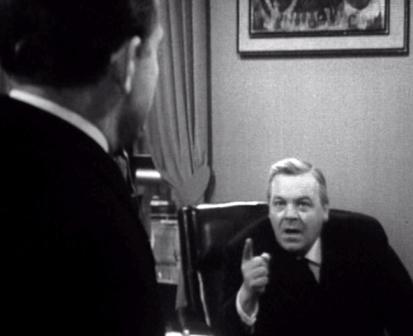
The final scene is in Wilder’s office. Hindlesham, Dowling, Don and Ken follow Wilder, all dressed in mourning. Wilder apologises to Ken saying he can’t help with the contract. That will be the new Minister’s decision. When Don protests that it’s only an hour since they buried Bligh, A tearful Ken says, “You always wanted him out of the way” but Wilder snaps back, “It wasn’t me that hated him.”
A powerful episode that ensures the conflict between Bligh and Wilder goes out with a bang. Greatorex deals forcefully with the issues, particularly the difficult question of gaining consent. Despite the publicity, this was still a high risk procedure. The listing in the TV Times had warned that 30 out of 109 heart transplant patients were still alive. By 1970, the figure was 10 out of 160 live transplants.
The real world context of the opening scenes reflects again the consequences of the 1967 devaluation of the pound and new Chancellor Roy Jenkin’s decision for complete withdrawal of British forces East of Suez. In the view of the Americans, Britain was no longer a powerful ally that could hold the line against “international Communism” in the Middle East. Wilder’s plan to invest in Somalia as a “jumping off post” was very much a reaction to this crisis. However, investment in Somalia may not have gained much benefit since the government was overthrown in October 1969.
Greatorex parallels the climax of the Bligh/Wilder relationship with a significant development for Lincoln Dowling. At one point he asks if Wilder’s saying he’s a good liar. “Let’s say you dissemble with integrity, ” Wilder replies. But Wilder’s wariness rightfully increases with his admiration. Dowling has been learning too well from Wilder.

After the scene where Ken has demanded to be put on the shortlist for Somalia, Wilder instructs Don to take Orme’s and Strakers off the shortlist. Dowling congratulates Wilder – Ken is bound to taunt Caswell about Ormes and Strakers. When Caswell reports it to the Foreign Secretary they won’t be on the list and he’ll seem out of touch.
But we later learn that Dowling tipped Ken off about the Somalia shortlist. He explains to Ken that. “For my trying and highly responsible job – for which I had to get a degree and speak two languages – I get the princely sum of two and a half thousand a year. I’d do better in Coventry spraying cars. “ He tells Bligh he doesn’t want a bribe – he’s ambitious. “You can’t work with Wilder and not wonder what life’s about. What you’re doing on a slum dweller’s salary in a career subject to the whims of old bureaucrats with piles.”
”If I stay on in the Diplomatic Service I might – with luck and fair reporting on my work – be an Ambassador who matters at 55. But I’m a born climber. Some of my superiors distrust such a tendency….Besides, now they’re appointing Ambassadors from outside; journalists and politicians and big businessmen like Wilder, what’s in it for me?”
He tells Ken he’s pushing Wilder to give a smaller firm (Frintons) the Somalia job over Ormston’s and Strakers. He’s also advised them to acquire Ken’s firm because Ken’s in a strong position for future work with the Department. Dowling wants an option on 50% of the shares in Ken’s firm.
Like Harold Wilson and some of the younger Ministers in the Labour Government, Dowling is a working class boy who’s won a scholarship to a Grammar School. Unlike David Corbett in “The Plane Makers” he’s tried his best to assimilate himself into the system and doesn’t demand favours. But Dowling is now keenly aware that he can use his gifts to serve himself, rather than others.
Dowling is also icily sardonic, regarding Caswell as “stubborn, bloody-minded and scared lest Wilder should pull something off.” When Wilder organises a flight home from Africa for the stricken Minister, Dowling appals Don by saying, “That’s one way of culling the old stag from the herd.”
Dowling’s comment is reminiscent of Wilder’s reaction when Lord Elberdson, chairman of their Merchant Bank dies in The Planemakers,)
Jack Watling holds his own with a great deal of non-verbal communication of Don Henderson’s lack of comfort with the situation. It’s Don who stays late at his Whitehall office to break the news to Ken about his father and tries to convince him to forget their feud. Don surprises Dowling (who thinks he’s a “Wilder man – long service stripes all over your arm”) by expressing sympathy for Caswell as an outsider. “You and your mini-minded chums think the Diplomatic Service is a private estate!Public keep out!” Even Wilder recognises that Don has a “George Washington complex” and can’t always be taken into his confidence. Nevertheless, it is Don who he sends down to comfort Pamela in the final scene when she’s upset over Caswell’s funeral.
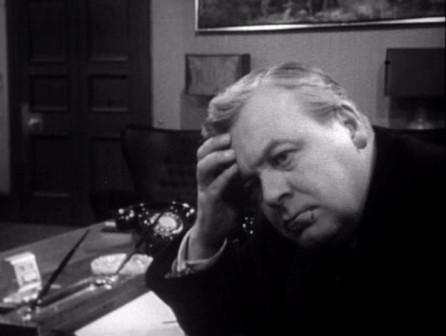
Ken Bligh walks out of the office leaving Wilder alone with his thoughts.
Peter Barkworth’s farewell performance as Ken Bligh is sad but convincing. We see him looking wistfully at the family photo of accident victim Mr Taylor with his children, but when Mrs Taylor asks how old Caswell is, he’s embarrassed to admit he’s not sure. His drunken recital to Don over the breakdown of his marriage and his final tearful confrontation with Wilder show a broken man. Even Caswell finally regrets what he’s done to Ken advising him not to waste his inheritance. “Pay off your debts and get out of it. You were never cut out for business. You should have been a parson or a schoolmaster.”
Barkworth had of course been incredibly busy since the last series of “The Power Game”, appearing in standalone plays such as Peter Draper’s “A Roof Over Our Mouths” (!967) as well as in the Doctor Who story “The Ice Warriors” (1967) opposite “The Plane Makers” Wendy Gifford, and in “Where Eagles Dare”(1968) with Patrick Wymark. In January 1970 he would star as French resistance leader Vincent in former “Power Game” producer Rex Firkin’s series “Manhunt”.
Despite playing a fatally ill character, Clifford Evans delivered a typically robust performance as Caswell Bligh. Evans would go on to star in the August 1969 BBC play “Codename Portcullis” as former Government Minister Sir Ian Carfax, now a master of a Cambridge University college who was secretly working for British intelligence. This would spin off into the 1970 series “Codename” starring Evans, Alexandra Bastedo and Anthony Valentine..It goes without saying that Patrick Wymark rose to the challenge of this emotionally charged episode. He manages to convey an amused tolerance and understanding of Bligh without every slipping over into sentimentality. His silent, paranoid glances at Dowling and Henderson underline the consequences of a life spent constantly calculating and strategising.